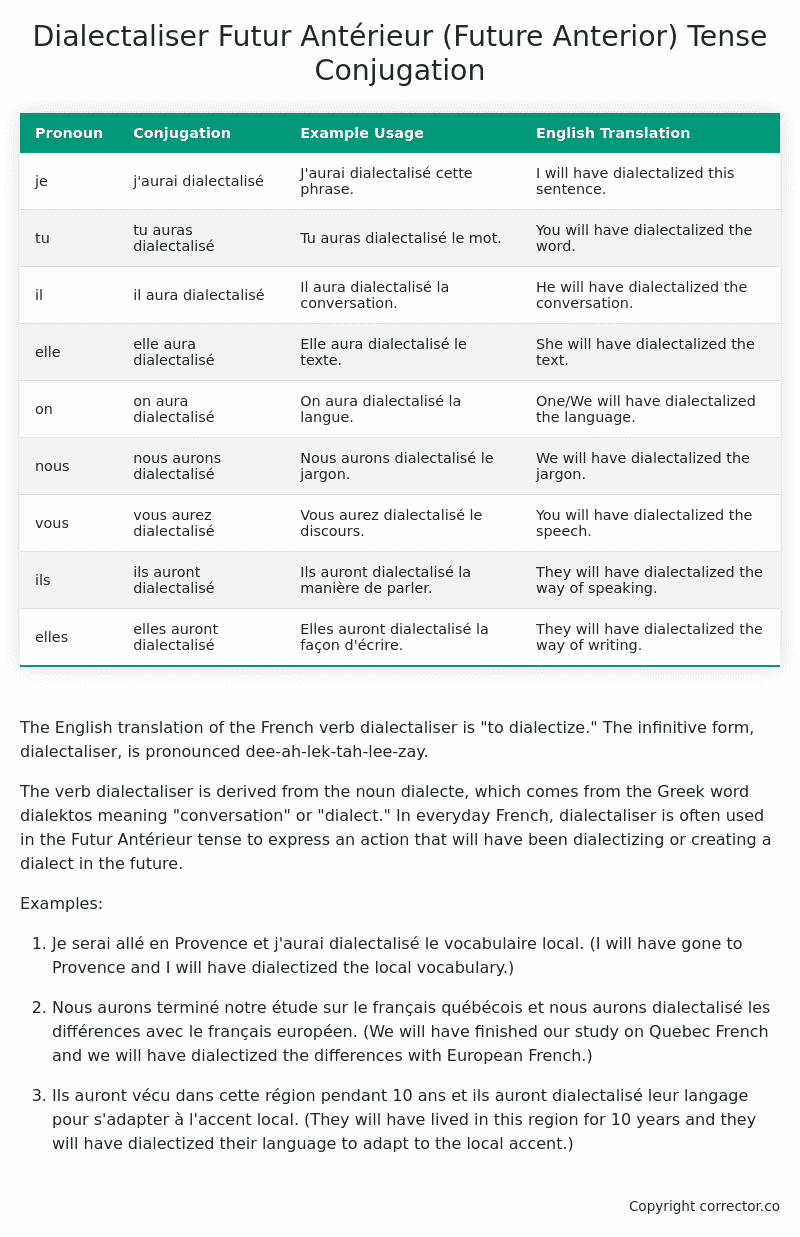Futur Antérieur (Future Anterior) Tense Conjugation of the French Verb dialectaliser
Introduction to the verb dialectaliser
The English translation of the French verb dialectaliser is “to dialectize.” The infinitive form, dialectaliser, is pronounced dee-ah-lek-tah-lee-zay.
The verb dialectaliser is derived from the noun dialecte, which comes from the Greek word dialektos meaning “conversation” or “dialect.” In everyday French, dialectaliser is often used in the Futur Antérieur tense to express an action that will have been dialectizing or creating a dialect in the future.
Examples:
-
Je serai allé en Provence et j’aurai dialectalisé le vocabulaire local. (I will have gone to Provence and I will have dialectized the local vocabulary.)
-
Nous aurons terminé notre étude sur le français québécois et nous aurons dialectalisé les différences avec le français européen. (We will have finished our study on Quebec French and we will have dialectized the differences with European French.)
-
Ils auront vécu dans cette région pendant 10 ans et ils auront dialectalisé leur langage pour s’adapter à l’accent local. (They will have lived in this region for 10 years and they will have dialectized their language to adapt to the local accent.)
Table of the Futur Antérieur (Future Anterior) Tense Conjugation of dialectaliser
| Pronoun | Conjugation | Example Usage | English Translation |
|---|---|---|---|
| je | j’aurai dialectalisé | J’aurai dialectalisé cette phrase. | I will have dialectalized this sentence. |
| tu | tu auras dialectalisé | Tu auras dialectalisé le mot. | You will have dialectalized the word. |
| il | il aura dialectalisé | Il aura dialectalisé la conversation. | He will have dialectalized the conversation. |
| elle | elle aura dialectalisé | Elle aura dialectalisé le texte. | She will have dialectalized the text. |
| on | on aura dialectalisé | On aura dialectalisé la langue. | One/We will have dialectalized the language. |
| nous | nous aurons dialectalisé | Nous aurons dialectalisé le jargon. | We will have dialectalized the jargon. |
| vous | vous aurez dialectalisé | Vous aurez dialectalisé le discours. | You will have dialectalized the speech. |
| ils | ils auront dialectalisé | Ils auront dialectalisé la manière de parler. | They will have dialectalized the way of speaking. |
| elles | elles auront dialectalisé | Elles auront dialectalisé la façon d’écrire. | They will have dialectalized the way of writing. |
Other Conjugations for Dialectaliser.
Le Present (Present Tense) Conjugation of the French Verb dialectaliser
Imparfait (Imperfect) Tense Conjugation of the French Verb dialectaliser
Passé Simple (Simple Past) Tense Conjugation of the French Verb dialectaliser
Passé Composé (Present Perfect) Tense Conjugation of the French Verb dialectaliser
Futur Simple (Simple Future) Tense Conjugation of the French Verb dialectaliser
Futur Proche (Near Future) Tense Conjugation of the French Verb dialectaliser
Plus-que-parfait (Pluperfect) Tense Conjugation of the French Verb dialectaliser
Passé Antérieur (Past Anterior) Tense Conjugation of the French Verb dialectaliser
Futur Antérieur (Future Anterior) Tense Conjugation of the French Verb dialectaliser (this article)
Subjonctif Présent (Subjunctive Present) Tense Conjugation of the French Verb dialectaliser
Subjonctif Passé (Subjunctive Past) Tense Conjugation of the French Verb dialectaliser
Subjonctif Imparfait (Subjunctive Imperfect) Tense Conjugation of the French Verb dialectaliser
Conditionnel Présent (Conditional Present) Tense Conjugation of the French Verb dialectaliser
Conditionnel Passé (Conditional Past) Tense Conjugation of the French Verb dialectaliser
L’impératif Présent (Imperative Present) Tense Conjugation of the French Verb dialectaliser
L’infinitif Présent (Infinitive Present) Tense Conjugation of the French Verb dialectaliser
Struggling with French verbs or the language in general? Why not use our free French Grammar Checker – no registration required!
Get a FREE Download Study Sheet of this Conjugation 🔥
Simply right click the image below, click “save image” and get your free reference for the dialectaliser Futur Antérieur tense conjugation!

Dialectaliser – About the French Futur Antérieur (Future Anterior) Tense
Construction
Common Everyday Usage Patterns
Interactions with Other Tenses
For example
Summary
I hope you enjoyed this article on the verb dialectaliser. Still in a learning mood? Check out another TOTALLY random French verb conjugation!


